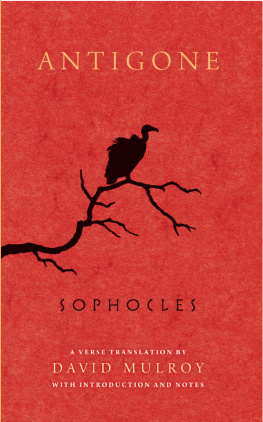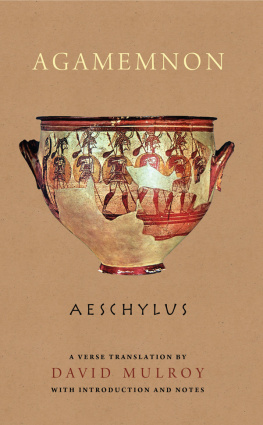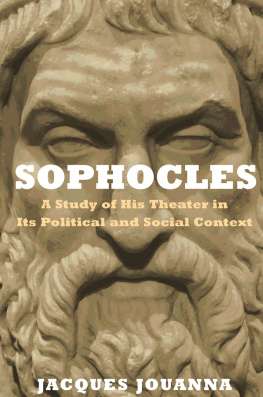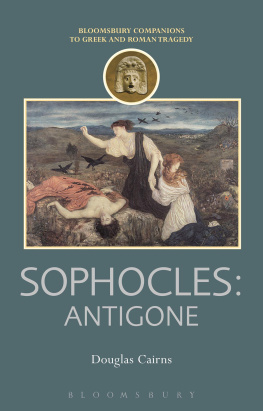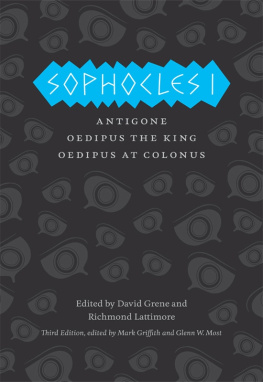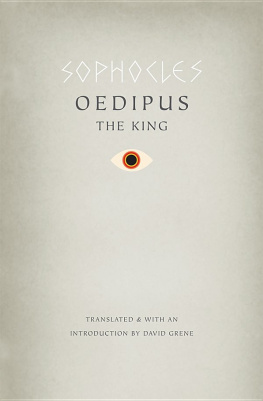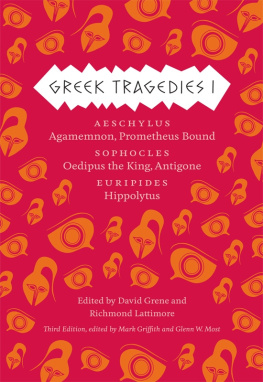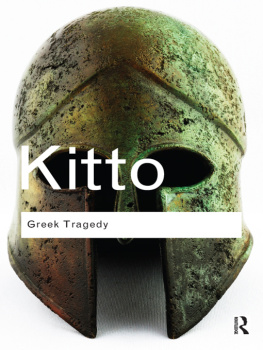Antigone

SOPHOCLES
A verse translation by
David Mulroy
with introduction and notes
The University of Wisconsin Press
The University of Wisconsin Press
1930 Monroe Street, 3rd Floor
Madison, Wisconsin 53711-2059
uwpress.wisc.edu
3 Henrietta Street
London WCE 8LU, England
eurospanbookstore.com
Copyright 2013
The Board of Regents of the University of Wisconsin System
All rights reserved. No part of this publication may be reproduced, stored in a retrieval system, or transmitted, in any format or by any means, digital, electronic, mechanical, photocopying, recording, or otherwise, or conveyed via the Internet or a website without written permission of the University of Wisconsin Press, except in the case of brief quotations embedded in critical articles and reviews.
Printed in the United States of America
Library of Congress Cataloging-in-Publication Data
Sophocles.
[Antigone. English]
Antigone / Sophocles ; averse translation by DavidMulroy,
with introduction and notes.
p. cm.(Wisconsin studies in classics)
Includes bibliographical references.
ISBN 978-0-299-29084-9 (pbk.: alk. paper)
ISBN 978-0-299-29083-2 (e-book)
I. Antigone (Greek mythology)Drama.
I. Mulroy, David D., 1943- II. Title.
III. Series: Wisconsin studies in classics.
PA4414.A7M78 2013
882.01dc23
2012015581
For
Shawn Welnak
Contents
Introduction
Synopsis
Oedipus, ruler of the ancient city of Thebes, unknowingly killed his father and married his mother. When he finally passed from the scene, he left four children behind: his sons Eteocles and Polyneices and his daughters Antigone and Ismene. Antigone is about the daughters.
After Oedipus departure, a civil war raged between the followers of Eteocles and Polyneices. Eteocles gained control of the city with the help of his uncle, Creon. Driven into exile, Polyneices raised an army in the southern kingdom of Argos and led it against Thebes. The Thebans in the city repelled his all-out attack, but Eteocles and Polyneices killed each other in the course of the battle.
The play begins the next morning. Thebes is safe, and royal power has passed to Creon. Outside the city walls, Antigone confers with Ismene. She asks whether Ismene has heard about their latest misfortune: Creon has issued a decree forbidding the burial of their brother, Polyneices, because he was a rebel. The penalty for burying him is death by stoning. Antigone asks if Ismene will help her bury Polyneices, which is their sacred duty. Shocked and terrified, Ismene says that she could not defy the law. Antigone, disgusted, declares that she would not accept Ismenes help now, even if it was offered.
Summoned by Creon, a chorus of elderly citizens enters, singing of Thebess glorious victory over the invaders. Creon arrives and repeats his proclamation forbidding the burial of Polyneices.
A soldier enters with news for Creon. Reluctantly coming to the point, he reveals that someone or something has sprinkled dust on Polyneices corpse! The chorus wonders whether the gods were responsible. Creon ridicules the idea, blaming the offense on a person or people opposing him for financial reasons. He sends the guard back with orders to find the guilty party or else. The guard is relieved to get away with his life: Dont think youll see me coming here again.
The chorus sings an ode praising the ingenuity of the human race. Man traps and tames animals, builds shelters against storms, crosses the stormy sea. The one problem for which he has found no solution is death.
The soldier reappears. He is escorting Antigone and gleefully reveals that he caught her trying to bury Polyneices. Creon asks her whether she knew about his decree. She did, she says, but did not think that it superseded the gods secure, unwritten laws. The latter, she tells him, live forever. No one knows their source.
Infuriated, Creon declares that he would not be a man if Antigone were allowed to overrule him. Believing that Ismene must have been an accomplice, he orders her arrest too. When brought before him, Ismene says that she is indeed guilty, but Antigone contradicts her, denying that Ismene has any right to share in her fate.
Ismene reminds Creon that his own son, Haemon, is engaged to marry Antigone. Creon is unmoved: Well find another fertile field to plow.
The chorus sings an ode lamenting the troubles that the gods have piled on the members of Oedipus family.
Haemon enters. Guessing that he is upset over Antigones condemnation, Creon justifies it: nothing is more important than proper civic order, and one must never be defeated by a woman.
Haemon respectfully suggests that his father consider public opinion, which favors Antigone. Creon replies angrily that he alone is the citys ruler, while Haemon has evidently been enslaved by a female. Haemon, angered in turn, warns that if Antigone dies, she will destroy anothers life. Creon interprets this as a threat and orders Antigone brought to him and executed before Haemons very eyes. Declaring that that will never happen, Haemon storms out.
Creon again orders the sisters to be brought out and executed. The choral leader asks whether he really intends to kill them both. Creon says that only Antigone must die, imprisoned in a rocky cavern with just enough food to shield Creon from the moral pollution attached to killing kinsmen.
Led to her prison, Antigone exchanges songs of lamentation with the chorus. She also justifies her devotion to her brother: a husband or a child could be replaced, but since her parents are dead, she will never have another brother.
The chorus sings an ode about other heroes and heroines who endured imprisonment.
An old blind prophetTiresiasenters with dire warnings for Creon. The behavior of the birds and the appearance of sacrificial meat show that the gods are angry at his treatment of Polyneices corpse and Antigones imprisonment. Creon will pay for the corpse that he is withholding from Hades with a corpse from his own family.
Creon is shaken by the prophets terrible words. After a brief exchange with the choral leader, he rushes out toward the countryside with his servants to bury Polyneices and free Antigone.
The chorus sings an ode invoking the help of Dionysus, god of wine and revelry. At its conclusion, a messenger arrives from the countryside with horrible news: Haemon is dead.
Before the messenger can explain how the tragedy occurred, Haemons mother, Eurydice, enters. She has heard some commotion and asks what happened. Go on, she says. Ive often heard bad news before.
The messenger is one of the servants who followed Creon. He says that they first stopped to burn what remained of Polyneices corpse, then hurried to Antigones cave. There they discovered that she had hanged herself and that Haemon had broken in and was embracing her around the waist. Creon asked him to come out. Haemon glared, spat in his fathers face, and lunged at him with his sword but missed. Then he plunged the sword into his own chest and fell on the girl, splattering her cheeks with his blood.
At the end of the messenger speech, the choral leader notices that Eurydice has departed. The messenger goes into the palace to make certain that she is not going to do anything foolish.
Creon arrives, carrying Haemons corpse. Laying it down, he bursts into song. His lyrical lamentation is punctuated by the comments of the choral leader and by the words of the messenger, who returns from the palace with the news that Eurydice is also dead. Creon prays for instant death. The leader of the chorus merely replies that future affairs will be in the hands of those responsible and watches as Creon is led back into the palace. (In later myths, he is denied the comfort of a quick death. Still ruling Thebes, he oversees the upbringing of Heracles and is finally killed by a usurper during one of Heracles prolonged absences. The story is told in Euripides

